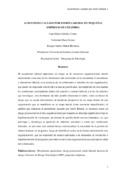Mostrar el registro sencillo del ítem
Ausentismo causado por estrés laboral en pequeñas empresas de Colombia
| dc.contributor.advisor | Urrutía Vivas, Ricardo Andrés | |
| dc.creator | Ceballos Cortes, Lina María | |
| dc.creator | Maca Gómez, Valentina | |
| dc.creator | Marín Hermosa, Brayan Andrés | |
| dc.date.accessioned | 2023-11-07T17:07:41Z | |
| dc.date.available | 2023-11-07T17:07:41Z | |
| dc.date.created | 2022 | |
| dc.identifier.uri | http://hdl.handle.net/20.500.12237/2531 | |
| dc.description | El ausentismo laboral representa un riesgo en la estructura organizacional, siendo denominado como uno de los fenómenos más recurrentes en la actualidad, el ausentismo o absentismo laboral, es la ausencia de un colaborador o miembro de una organización, que puede ser soportado a través de excusas no justificadas, incumpliendo de esta manera las condiciones contempladas dentro del acuerdo o contrato laboral, a la luz de artículos que investigan este fenómeno, ha sido posible relacionar el estrés, como un factor de riesgo que se asocia directamente al abandono progresivo de un cargo dentro de una organización que se manifiesta en su etapa inicial como ausencias injustificadas, el análisis que relaciona el ausentismo causado por estrés laboral, se reconoce como un riesgo psicosocial en el área organizacional que requiere un abordaje significativo bajo la implementación de estrategias, un sistema de gestión desde recursos humanos, SST, que prevenga y disminuya la aparición de síntomas asociados a estrés por condiciones laborales, es así como este artículo busca contextualizar la necesidad de la gestión de talento humano en las pymes, luego de identificar vacíos en la forma estructural de esta organizaciones, que no responden de manera adecuada a las demandas en resolución o implementación de programas preventivos en el área organizacional que protejan la salud del colaborador. | spa |
| dc.description.abstract | Absenteeism represents a risk in the organizational structure, being called one of the most recurrent phenomena today, absenteeism or labor absenteeism, is the absence of a collaborator or member of an organization, which can be supported through excuses unjustified, thus breaching the conditions contemplated within the employment agreement or contract, in light of articles that investigate this phenomenon, it has been possible to relate stress, as a risk factor that is directly associated with the progressive abandonment of a position within of an organization that manifests itself in its initial stage as unjustified absences, the analysis that relates absenteeism caused by work stress, is recognized as a psychosocial risk in the organizational area that requires a significant approach under the implementation of strategies, a management system from human resources, which prevents and reduces the appearance of symptoms associated Due to stress due to working conditions, this is how this article seeks to contextualize the need for human talent management in SMEs, after identifying gaps in the structural form of these organizations, which do not respond adequately to the demands in resolution or implementation. of preventive programs in the organizational area that protect the health of the collaborator. | spa |
| dc.format.mimetype | application/pdf | spa |
| dc.subject | Riesgo psicosocial | spa |
| dc.subject | Estrés laboral | spa |
| dc.subject | Factores de riesgo psicológico | spa |
| dc.title | Ausentismo causado por estrés laboral en pequeñas empresas de Colombia | spa |
| dc.subject.subjectenglish | Psychosocial risk | spa |
| dc.subject.subjectenglish | Work stress | spa |
| dc.subject.subjectenglish | Psychological risk factors | spa |
| dc.rights.accessRights | info:eu-repo/semantics/openAccess | spa |
| dc.creator.degree | Psicólogo/a | spa |
Ficheros en el ítem
Este ítem aparece en la(s) siguiente(s) colección(ones)
-
Psicología [203]

